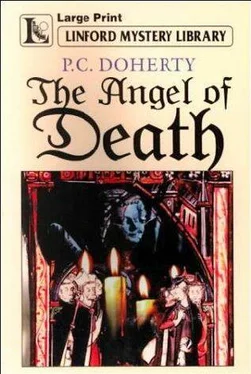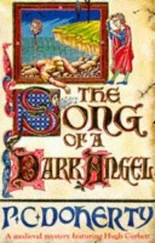Paul Doherty - Angel of Death
Здесь есть возможность читать онлайн «Paul Doherty - Angel of Death» весь текст электронной книги совершенно бесплатно (целиком полную версию без сокращений). В некоторых случаях можно слушать аудио, скачать через торрент в формате fb2 и присутствует краткое содержание. Жанр: Исторический детектив, на английском языке. Описание произведения, (предисловие) а так же отзывы посетителей доступны на портале библиотеки ЛибКат.
- Название:Angel of Death
- Автор:
- Жанр:
- Год:неизвестен
- ISBN:нет данных
- Рейтинг книги:4 / 5. Голосов: 1
-
Избранное:Добавить в избранное
- Отзывы:
-
Ваша оценка:
- 80
- 1
- 2
- 3
- 4
- 5
Angel of Death: краткое содержание, описание и аннотация
Предлагаем к чтению аннотацию, описание, краткое содержание или предисловие (зависит от того, что написал сам автор книги «Angel of Death»). Если вы не нашли необходимую информацию о книге — напишите в комментариях, мы постараемся отыскать её.
Angel of Death — читать онлайн бесплатно полную книгу (весь текст) целиком
Ниже представлен текст книги, разбитый по страницам. Система сохранения места последней прочитанной страницы, позволяет с удобством читать онлайн бесплатно книгу «Angel of Death», без необходимости каждый раз заново искать на чём Вы остановились. Поставьте закладку, и сможете в любой момент перейти на страницу, на которой закончили чтение.
Интервал:
Закладка:
Corbett's mind, however, had wandered off, concentrating on the king's major problem: Edward was bankrupt. Two years ago he had debased his coinage, then he had begun to raise taxes in one parliament after another and collectors of the tax on land were sent into the shires and boroughs to claim the king's due. The demand for money was relentless: Edward was at war with France, attempting to save the English Duchy of Aquitaine from Philip IV's acquisitive clutches. Moreover, the King had recently put down a serious revolt in South Wales and only a year ago he had sacked Berwick and brought Balliol and others to their knees. Yet the rebellion in Scotland refused to subside. News had come south of a new Scottish war leader, a commoner, William the Wallace, who had fanned the flames of unrest by perpetrating secret night raids on isolated garrisons and columns, not missing any opportunity to harass and attack the English occupiers.
The wars demanded good silver. Edward had taken loans from the Italian bankers, the Frescobaldi, but now they would give no more and so he had turned on the Church. The Church was wealthy, a fat milk cow, and Edward dearly wanted to separate some of its riches from it. He had seized the tax levied by the former pope, Nicholas IV, who had nurtured grand ideas of uniting all Christendom in a new offensive against the Turk. Edward had enthusiastically taken up the idea of a crusade but had seized the money raised. He then turned to the alien priories, those houses owned by religious orders abroad, seizing their revenue and temporalities. Corbett had played a significant role in the appropriation of this ecclesiastical wealth, going through memoranda rolls, documents and charters, searching out what the king's rights were in these matters. Time and again, Corbett with barons of the exchequer and other treasury officials, had met to study long lists of rents, dues and fee-farms owing to the king. The results had been meagre, certainly not enough to finance Edward's wars abroad, so the king had begun to cast envious eyes on the wealth of the rest of the English Church. In this he met two staunch opponents: Boniface VIII in Avignon, who was totally determined on the churches in Western Christendom resuming their regular payments to the coffers of St Peter, and Robert Winchelsea, consecrated archbishop four years earlier, who had a very clear idea about his own rights and those of the English Church.
Edward had summoned both the Archbishops of Canterbury and York to meet their clergy in convocation to raise taxes. However, shortly after the sack of Berwick, matters had been complicated by Boniface VIII issuing his bull, 'Clericis Laicos,' which Winchelsea had used to insist that the king could only tax the Church with the Church's permission. Edward, hiding his terrible anger, had bitterly agreed. Matters were further worsened, Corbett thought, as he looked along the row of dignitaries in front of him, by plotters like Bigod and Bohun, who not only resented royal taxation but also Edward's demands to accompany him abroad to fight the French. Soon these diverse plotting groups would unite and form the same opposition Edward's father and grandfather had faced when trying to raise money for disastrous wars abroad.
Corbett stared through the haze of incense at the tall emaciated figure of the chief celebrant, Walter de Montfort: Archbishop Winchelsea had decided that the Church's case – requiring its full approval before it was taxed should be put to the king by no less a person than the Dean of St Paul's, Walter de Montfort. The archbishop's choice was a quiet, deadly insult to Edward, for the dean was a member, albeit tenuously, of the great de Montfort family who forty years ago had opposed Edward and his father, King Henry. Simon de Montfort, Earl of Leicester, one of the great barons of the time, had risen in revolt, seized the government and virtually dictated his own terms to the defeated monarch, Henry III.
Edward, then Prince of Wales, had quietly accepted such demands until he had gathered sufficient forces for a counter-attack. The ensuing civil war was a bloody, vicious affair, ending only when de Montfort was killed, hacked to pieces at the Battle of Evesham. After that the de Montforts, or most of those who had survived the collapse of Earl Simon, had gone abroad, but continued a secret war against Edward, sending assassins into the country to kill him and attacking his envoys abroad. On one occasion they even murdered the king's cousin while he was at mass en route to Rome. Of course, Walter de Montfort was not a traitor, nor even tainted with any treason, but he was a fiery, logical, eloquent preacher and, Once again, Edward would be faced by a de Montfort lecturing him on the limitations of the Crown in taxing its subjects. It would not be a pleasant meeting. Corbett had met the king just after he learnt of the choice of speaker and his anger had been uncontrollable.
'By God's mouth!' he muttered. 'Must I listen to a de Montfort tell me when and where I can get my monies from? I will not forget Winchelsea's insult. I do not bear such grudges lightly.'
Edward, when crossed, was a vindictive man, as the sack of Berwick proved. Corbett himself owed a great deal to the king. He had risen through the ranks to become a senior clerk in the chancery, with fat fees, two pleasant town houses and a manor with good land and grazing near Lewes in Sussex. Nevertheless, he was always wary of the king, for Edward's temper, since the death of his beloved Eleanor, was always fickle and his moods could swerve abruptly like a wind at sea arising suddenly to destroy anything in its path. Edward's anger could lash and vindictively punish even great lords who dared to oppose him.
Corbett suddenly reasserted himself. The consecration prayer had finished; there would be the kiss of peace before the Eucharist was shared. De Montfort, grandly attired in gold and purple copes, walked down the altar steps towards the king and, bowing, put his hands lightly on the king's shoulders and kissed him gently on each cheek.
'Pax Domini sit semper vobiscum.'
'Et cum spirituo,' the king whispered.
Then de Montfort, resplendent in liturgical robes as well as his own arrogance, walked back to the altar where the mass continued.
The choirs sang the Agnus Dei emphasizing the 'miserere nobis', their chant trailing away, lost in the high vault of the cathedral. Corbett felt himself relax; the music soothed and calmed him. There was little point in worrying and he began to search his own soul in preparation for the sacrament. The Host was elevated, the bells rung. Corbett looked at Ranulf to ensure he still had the proper pious expression. There was a short interruption in the service as the Host was passed around, the celebrant priests now in a huddle around the altar, then the chalice was circulated. Corbett saw de Montfort turn to elevate the Host to the rest of the congregation.
'Ecce Agnus Dei, qui tollit peccata mundi – Behold the Lamb of God, who takes away the sins of the world. Suddenly de Montfort went rigid and the ciborium slipped from his hand, dashing the white hosts like snowflakes onto the altar steps. The man's hand went out, pointing at the king, his usually skull-like face now almost cadaverous, the skin drawn tight, the eyes bulging. Corbett rose, his hand searching for the knife beneath his cloak. De Montfort's mouth opened and shut like a landed carp, then with a loud cry he fell headlong down the steps, his skull crashing against the stone. For a few seconds there was absolute silence, followed by consternation. Several knights of the royal household ran up, pushing their way through the crowds into the sanctuary, looking around up into the nave to see if de Montfort had been brought down by some mysterious assassin. There was shouting, screaming. Corbett saw Sir Fulk Bassett, a young knight banneret and a member of Edward's household, go across the sanctuary and kneel beside de Montfort's rigid body. He gave him the most superficial look, turned and shouted across to the king.
Читать дальшеИнтервал:
Закладка:
Похожие книги на «Angel of Death»
Представляем Вашему вниманию похожие книги на «Angel of Death» списком для выбора. Мы отобрали схожую по названию и смыслу литературу в надежде предоставить читателям больше вариантов отыскать новые, интересные, ещё непрочитанные произведения.
Обсуждение, отзывы о книге «Angel of Death» и просто собственные мнения читателей. Оставьте ваши комментарии, напишите, что Вы думаете о произведении, его смысле или главных героях. Укажите что конкретно понравилось, а что нет, и почему Вы так считаете.












